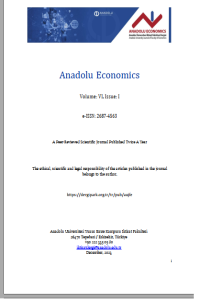İnceleme Makalesi
Araştırma Makalesi
Sayı Hakemleri




Amaç ve Kapsam
Anadolu University Journal of Faculty of Economics (Anadolu Economics) is a peer-reviewed and scientific journal published biannually (in May and November) and electronically since 2019. Manuscripts submitted to the Anadolu Economics will go through a double-blind peer-review process. Its objective is to provide a platform for the scholarly exchange of research findings, and significant empirical, conceptual, or theoretical contributions to related fields. The journal aims to contribute to the dissemination of scientific knowledge and hence to transform knowledge into value by allowing scholars to access freely to scientific literature. The target audience of the Anadolu Economics is scholars, researchers, professionals, academic institutions, and public or nongovernmental organizations in related fields.
All content of the Anadolu Economics is freely available without any charge to the users. Users are allowed to read, download, distribute, print out, and link to articles in full text without asking prior permission from the publisher or the author freely for non-commercial purposes provided that they have properly cited.
Anadolu Economics publishes quality and in-depth scientific articles on economics, public finance, social policy and labor relations, public administration, political science, and international relations. The language medium of the journal is Turkish and English. Anadolu Economics primarily considers empirical and theoretical "research articles" and also welcomes "Review articles", "Letter to the Editor", and "Book reviews" for evaluation provided that they are prepared in accordance with the journals writing guidelines. The manuscripts must not have appeared or submitted for publication elsewhere while under consideration by the journal.
Yazım Kuralları
Online Manuscript Submission
Anadolu Economics is hosted on DergiPark, which provides online hosting and editorial workflow management services for academic journals. Manuscripts can only be submitted through the journal’s online manuscript submission system available at https://dergipark.org.tr/tr/pub/aujfe. Manuscripts submitted via any other medium will not be evaluated. If you do not have an account, you need to create a new one.
Any correspondence, queries, or additional requests for information on the manuscript submission process should be sent to the editorial office e-mail account below:
iktisatdergi@anadolu.edu.tr
1. Starting Submission:
Before submitting your manuscript, please ensure that the subject matter of your manuscript is consistent with the aim and scope of the Journal.
2. Submission Information:
Authors should fill in the necessary information, the title, and abstract of their manuscripts in relevant fields. Keywords and JEL Codes are also needed to be submitted. Those informations are used for indexing and abstracting in scientific databases and search engines.
3. Manuscript Uploading:
Authors should follow the system's instructions to upload their manuscripts. The manuscript should not include any identifying information, such as the authors' names, affiliations, or e-mails. Those informations should be submitted with a separate title page, containing the title, all author names, affiliations, ORCID numbers, and the contact information of the corresponding author. Any acknowledgments, disclosures, or funding information should also be included on the title page. If your manuscript is based on a dissertation, the title of the dissertation should not be mentioned in footnotes.
Uploaded files should include:
1. Manuscript (author name section in the manuscript template should be left blank during submission.) (click here to download the manuscript template)
2. Title page (including author(s) name, surname, institution, e-mail, address, ORCID number) (click here to download the form)
3. Author Contributions Form (click here to download the form)
4. Manuscripts requiring ethical committee approval should upload the files related to ethical committee approvals as Ethical Committee Approval File. Studies that do not require ethical committee approval must upload the Compliance with Ethical Standards Form as Ethical Committee Approval File. (click here to download the Compliance with Ethical Standards Form)
Journal Writing Guidelines
All manuscripts should conform to the Anadolu Economics manuscript template.
The manuscript should not include any identifying information, such as the authors' names, affiliations, or e-mails.
All identifying informations containing author names, affiliations, e-mails should be submitted with a seperate Title page. Any acknowledgements, disclosures, or funding information should also be included on Title page.
1. Word and Page Limits
Articles submitted should not exceed 9.000 words (not including abstract and references).
The abstract should not exceed 150 words.
All articles should include at least 3 keywords.
All articles should contain at least 2 JEL Codes.
2. Writing Style and Page Format
2.1. Main body of the manusicript
Manuscripts should be provided in Microsoft Word format on an A4 size paper.
Top, bottom, left, and right page margins should be 2,5 cm.
All pages of the manuscript should be numerated consecutively and centered at the bottom of the page.
Manuscript title should be left justified, bold, Arial 20 font style, and capitalize only the first letters.
Line spacing should be single for abstract and main body of the manuscript.
Arial 12 font size should be used throughout the text (except for the abstract).
Paragraphs should be justified.
Paragraphs should not have an indentation.
6 nk line spacing should be given after all paragraphs.
Headings must be concise and descriptive. Headings should not be numbered.
Tables should be numbered consecutively. Table captions should appear above the table and should be left justified.
All graphics, maps, and images should be labelled as Figure. All figures should have a caption and numbered consecutively. Figure captions should appear below the figure and left justified.
Tables and figures should be incorporated in the manuscript and should not be submitted in separate files. References for the tables and figures should be given below and comply with the in-text citation rules.
An equation editor should be used to write and format the equations in the manuscript. Equations should be numbered in parenthesis and numbers should be right aligned and consecutive.
Title of the books, movies, and tv programs should be italicize in the text.
A new or technical term could be italicise the first time they appear in the text.
Common Latin (or other) abbreviations or words should not be italicized. e.g.: a priori, vis-a-vis, per se, etc..
At the beginning of sentences, spell out numbers except for the years. e.g.: Thirteen people received awards..
Use points to separate thousands. e.g.: 4.567, etc.
Use comma for decimals. e.g.: 15,2; 0,56; etc..
Footnotes should be displayed at the bottom of related pages. Arial 8 font size should be used for footnotes.
Ethical approval must have been obtained from the appropriate ethics committee to confirm the study meets ethical standards. A statement to confirm this must be included at the end of the manuscript (before the references section) in a separate section entitled “Compliance with Ethical Standards” when submitting a paper, which must provide details of the name of the ethics committee and reference/permit numbers where available.
Appendices should appear after the References. If you include just one appendix, it is simply called “Appendix” and referred to as such in-text. When more than one appendix is included, they should be labeled “Appendix A,” “Appendix B,” and so on. e.g.: Participants stated that they had often felt “alienated” from their peers due to their racial background (see Appendix A and Appendix B for full interview transcripts)...
2.2. Abstract and Keywords
Abstract should be written one line spaced, justified, italicised, and Arial 10-point font style.
Abstract should be written in paragraph format.
"Abstract" heading should be Arial 12 font size, left justified, and bold.
If the language of the manuscript is in Turkish, the abstract should be written both in Turkish and English. There is no need for a Turkish abstract for manuscripts written in English.
Keywords and JEL Codes should be left justified and Arial 10 font style.
Submission should include at least 3 appropriate and short keywords and at least 2 JEL Codes that capture the principal topics of the paper.
2.3. Compliance with Ethical Standards
Any research using qualitative or quantitative approaches that requires data collection from participants using questionnaires or interviews must be approved by an ethical committee. Authors must provide details of the name of the ethics committee and reference/permit numbers where available. Otherwise, "ethical committee approval is not required", or if the language of the manuscript is in Turkish "Etik kurul izni gerekmemektedir" should be written in this section.3. Citations and References
Anadolu Economics adheres to the APA reference style. View the Publication Manual of American Psychological Association or click here to get your manuscript conform to journal style of referencing.
Footnotes are not allowed for citations. Citations within the text should include the name of the author, the date of the source, and, if necessary, the page numbers you used. The rest of the information, such as the title and publication details, should be included in the bibliography.
References to other publications in your text should be written as follows:
Single author: (Adams, 2006)
Two authors: (Adams and Brown, 2006)
When referring to pages in a publication, use ‘p.(page number)’ for a single page or ‘pp.(page numbers)’ to indicate a page range.
Page numbers should always be written out in full, e.g. 175-179, not 175-9.
References should be written one line spaced and should be listed in alphabetical order by author's last name.
Reference entries should be arranged in alphabetical order by authors' last names followed by their initials.
Journal names should not be abbreviated.
One line space should be given between each Reference entry.
If the Reference list includes two or more entries by the same author(s), list them in chronological order with the earliest first.
If a reference would be ambiguous because it has the same author(s) and year as another reference, lower-case letters ("a", "b", etc.) should be placed immediately after the year, e.g. "(Jones 1983a, 1983b)".
References should include the DOI for all works that have one.
When the original date of publication of major classical works such as Marx and Freud are known, it should be include it in the references. e.g.: Freud, S. (1953). The method of interpreting .... (Original work published 1900)
For referencing books and reports, the publication place (city) should come first followed by the publisher's name. e.g.: Ankara: İmge; New York, NY: McGraw-Hill.
Some Examples of Referencing Style:
Book with single author:
Nettle, D. (2005). Happiness: The science behind your smile. Oxford, UK: Oxford University Press.
Book with multiple authors:
Abelson, H., Ledeen, K., & Lewis, H. R. (2008). Blown to bits: Your life, liberty, and happiness after the digital explosion. Upper Saddle River, NJ:Addison-Wesley.
Book with single editor:
Özbek, M. (Ed.) (2005). Kamusal Alan. İstanbul: Hil.
Book chapter in edited book:
Wesson, J., & Cowley, L. (2005). An introduction to human-centered software engineering. In A. Seffah, J. Gulliksen, & M. C. Desmarais (Eds). Human-centered software engineering: Integrating usability in the software development lifecycle (pp. 3-14). Dordrecht, Netherlands: Springer.
Books with several editions:
Strunk, W. Jr. & White, E. B. (2000). The Elements of Style (4. Ed.). New York: Longman.
Electronic-only book:
Schiraldi, G. R. (2001). The post-traumatic stress disorder sourcebook: A guide to healing, recovery, and growth [Adobe Digital Editions version]. doi: 1 0.1036/0071393722
Multivolume books:
Pflanze, O. (1963-1990). Bismarc and the Development of Germany (Vol. 1-3). Princeton, NJ: Princeton University Press.
Single volume in a multivolume book:
Pflanze, O. (1990). The Period of Fortification, 1880-1898: Vol. 3. Bismarck and The Development of Germany. Princeton, NJ: Princeton University Press.
Republishing of an earlier book:
Smith, A. (1976). An inquiry into the nature and causes of the wealth of nations. E. Cannan (Ed.). Chicago: University of Chicago Press. (Original work published in 1776).
In-text:(Smith, 1776/1976)
Translated chapter in a book:
Weber, M. (1958). The Protestan Ethic and The Spirit of Capitalism. T. Parsons (Trans.). New York: Charles Scribner‟s Son. (Original work published in 1904-1905).
Journal article with single author:
Aktay, Y. (1999). Aklın Sosyolojik Soykütüğü: Soy Akıldan Tarihsel ve Toplumsal Akla Doğru. Toplum ve Bilim, 82, 114-140.
Journal article with multiple authors:
Binark, F. M. & Çelikcan, P. (1998). Mahremin Müzakereye Çağrılması ve Yıldo Örneği. Kültür ve İletişim, 1 (2), 197-214.
Journal article with DOI:
Von Ledebur, S. C. (2007). Optimizing knowledge transfer by new employees in companies. Knowledge Management Research & Practice, 6, 249-267. doi: 1 0.1 057/palgrave.kmrp.8500141
Technical and research reports:
Gencel Bek, M. (1998). Mediscape Turkey 2000 (Report No. 2). Ankara: BAYAUM.
Editorials with no authors:
Editorial: "What is a disaster" and why does this question matter? [Editorial]. (2006). Journal of Contingencies and Crisis Management, 14, 1-2.
Newspaper articles with no authors:
The United States and the Americas: One History in Two Halves. (2003, 13 December). Economist, 36.
In-text: (United States and the Americas, 2003)
Newspaper articles with an author:
Bruni, F. (2003, 26 Aralık). Pope pleads for end to terrorism and war. New York Times, s.21.
Unpublished dissertation and thesis, posters, and, proceedings:
Sarı, E. (2008). Kültür Kimlik ve Politika: Mardin’de Kültürlerarasılık. (Unpublished doctoral dissertation or master's thesis). Ankara Üniversitesi Sosyal Bilimler Enstitüsü, Ankara.
Encyclopedia:
Balkans: History. (1987). Encyclopaedia Britannica (15. Ed. Vol. 14, pp. 570-588). Chicago: Encyclopaedia Britannica.
In-text: (Balkans: History, 1987)
Dictionaries:
Gerrymander. (2003). Merriam-Webster’s collegiate dictionary (11. Ed). Springfield, MA: Merriam-Webster‟s.
In-text: (Gerrymander, 2003)
Interview:
Arroyo, G.M. (2003). A time for Prayer. Michael Schuman ile söyleşi. Time. 28 Temmuz 2003. Erişim Tarihi 13 Ocak 2004, http://www.times.com/time/nation/article/0,8599,471205,00.html
TV programs:
Long, T. (Writer) & Moore, S. D. (Director). (2002). Bart vs. Lisa vs. 3. Grade[TV Series]. B. Oakley ve J. Weinstein (Producer), in Simpsons. Episode: 1403 F55079. Fox.
In-text: (Simpsons, 2002)
Movies:
Huston, J. (Director). (1941). Malta Şahini [Movie]. U.S.: Warner.
In-text: (Malta Şahini, 1941)
Photographs:
Adams, A. (1927). Monolith, the face of Half Dome, Yosemite National Park [Photograph]. Art Institute, Chicago.
In-text: (Adams, 1927)
Etik İlkeler ve Yayın Politikası
Peer Review Process and Publication Policy
All manuscripts are initially screened for relevance, originality, and contribution by the Editors. Only manuscripts of sufficient quality that meet the scope of the Anadolu Economics will be sent out to two referees for double-blind reviewing. The reviewers are selected according to their expertise by the Editors. The reviewers should not have collaborated with any of the authors before and all reviewers should be from different institutions to the authors. Reviewers are expected to provide a detailed point-by-point review. On the basis of reviewer comments, the Editors may recommend acceptance, revision, or rejection of a manuscript. The Editor in Chief considers all the returned reviews before making an overall decision. If the reviews differ widely, the Editors may invite an additional reviewer so as to get an extra opinion before making a decision. After review of the manuscript by at least two independent reviewers, in addition to the views of the Editor, the decision is relayed to the authors. If accepted, the paper is sent to production. If the article is rejected or sent back for either major or minor revision, the Editor in Chief should include constructive comments from the reviewers to help the author improve the article.
While the views of external reviewers are of primary influence on editorial decisions, the Editorial Board remains responsible for final decisions to or not to publish submitted manuscripts.
Plagiarism Policy
Anadolu Economics will not tolerate any form of plagiarism and duplicate (redundant) publication. Hence, the authors should check the manuscript content before submitting it to the Journal. Manuscripts are screened for plagiarism by the co-editors for all the submissions using iThenticate software before publishing online. If the manuscript is found to have an unacceptable level of similarity, it will be rejected and the author will be informed that the manuscript is not accepted to be published in the Journal.Ethical Principals and Responsibilities
Anadolu Economics works hard to ensure the content of the journal is ethically sound. To achieve that goal, we closely follow the advice laid out in the guidelines and flowcharts on the COPE (Committee on Publication Ethics) website.
Ethical approval must have been obtained from the appropriate ethics committee to confirm the study meets ethical standards. Any research using qualitative or quantitative approaches that requires data collection from participants using iquestionnaires or interviews must be approved by an ethical committee. A statement to confirm this must be included in the first page of the manuscript in a separate section entitled “Compliance with Ethical Standards” when submitting a paper, which must provide details of the name of the ethics committee and reference/permit numbers where available. Otherwise, "ethical committee approval is not required" should be written for studies that do not require ethical committee approval.
1. All submitted works to Anadolu Economics must be entirely original and used sources and materials should be appropriately cited. Any attempt of plagiarism should be followed by the rejection of the submitted manuscript.
2. The manuscripts should not have appeared elsewhere, and should not be submitted for publication elsewhere while under consideration by the Journal.
3. Authors should not submit the same work or describe essentially the same research in more than one journal.
4. The authors acknowledge that any part of the article does not violate the copyrights of other real and legal entity.
Ethical responsibilities for the Reviewers:1. The reviewers are bound to treat information regarding manuscripts submitted by authors as privileged information and keep them confidential.
2. In evaluating the submitted works, the reviewers should limit themselves only to the scientific content.
3. Reviewers should immediately notify the editors of Anadolu Economics of any misconduct on the part of any author(s) (e.g. plagiarism, any other unethical activities).
Ethical responsibilities for the Editors:1. Editors are obliged to make decisions based solely on the scientific evaluation of the article, regardless of the authors' origin, including the authors' ethnicity, political views, and religion.
2. Editors will not disclose any information about a submitted manuscript to anyone other than the corresponding author, reviewers, potential reviewers, and the publisher. Any manuscripts received for review are confidential documents and should be treated as such.
3. In case of suspicion of misconduct, plagiarism or other unethical activities related to the authors, Editors are obliged to manage the process within the framework of the relevant recommendations of the Committee on Publication Ethics (COPE).
4. In case of a suspicion of ghost, guest or gift authership, Editors are obliged to manage the process within the framework of the relevant recommendations of the Committee on Publication Ethics (COPE).
5. In case of a suspicion of conflicts of interest resulting from competitive, collaborative, or other relationships/connections with any of the authors, companies, or institutions connected to the papers, Editors are obliged to manage the process within the framework of the relevant recommendations of the Committee on Publication Ethics (COPE).
Ücret Politikası
Anadolu Economics neither charges any fees from the authors on any stage of the publication process nor pays royalty fees to the authors for their published articles.
Dergi Kurulları
Anadolu Economics, Anadolu Universitesi Yunus Emre Kampusu Iktisat Fakultesi 26470 Tepebasi / Eskisehir, Turkey
iktisatdergi@anadolu.edu.tr
e-ISSN: 2687-4563



